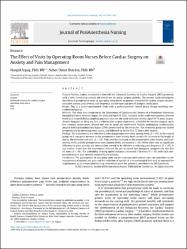The Effect of Visits by Operating Room Nurses Before Cardiac Surgery on Anxiety and Pain Management
Künye
Arpag, N., & Öztekin, S. D. (2023). The Effect of Visits by Operating Room Nurses Before Cardiac Surgery on Anxiety and Pain Management. Journal of perianesthesia nursing : official journal of the American Society of PeriAnesthesia Nurses, 38(6), 892–900. https://doi.org/10.1016/j.jopan.2023.01.022Özet
Purpose: Further studies are needed in line with the Enhanced Recovery for Cardiac Surgery (ERCS) protocols with a view to reducing anxiety and opioid use in cardiac surgery patients. The present study investigates the effects of preoperative visits by operating room nurses to patients scheduled for cardiac surgery on post -operative anxiety, pain severity and frequency, and the type and dose of analgesic medication.Design: This is a quasi-experimental study with a pretest-posttest control group design involving non-randomized groups.Methods: The study was conducted in the Department of Cardiovascular Surgery of a Foundation University Hospital in Turkey between August 20, 2020 and April 15, 2021. Included in the study were patients selected based on a nonprobability sampling approach who met the study inclusion criteria (aged 18-75 years, no psy-chiatric diagnosis or drug use, first cardiovascular surgery experience, scheduled for elective surgery, up to five coronary anastomoses, literate and able to speak and understand Turkish, undergoing cardiovascular surgery with Cardiopulmonary Bypass (CPB)) determined by the researcher. The treatment group was visited preoperatively by operating room nurses, and followed-up for the first 72 hours after surgery.Findings: The intervention was effective in reducing postoperative state anxiety levels (P < .05). In the control group, each one-point increase in the preoperative state-anxiety level caused a 9% increase in the length of stay in the intensive care unit (P < .05). Pain severity increased as the preoperative state-anxiety and trait-anxiety levels, and the postoperative state-anxiety levels, increased (P < .05). While there was no significant difference in pain severity, the intervention proved to be effective in reducing pain frequency (P < .05). It was further noted that the intervention reduced the use of opioid and nonopioid analgesics for the first 12 hours (P < .05). The probability of using opioid analgesics increased 1.56 times (P < .05) with each one-point increase in pain severity reported by the patients.Conclusions: The participation of operating room nurses in preoperative patient care can contribute to the management of anxiety and pain and the reduction of opioids. It is recommended that such an approach be implemented as an independent nursing intervention given the potential contribution to ERCS protocols.(c) 2023 American Society of PeriAnesthesia Nurses. Published by Elsevier Inc. All rights reserved.

















